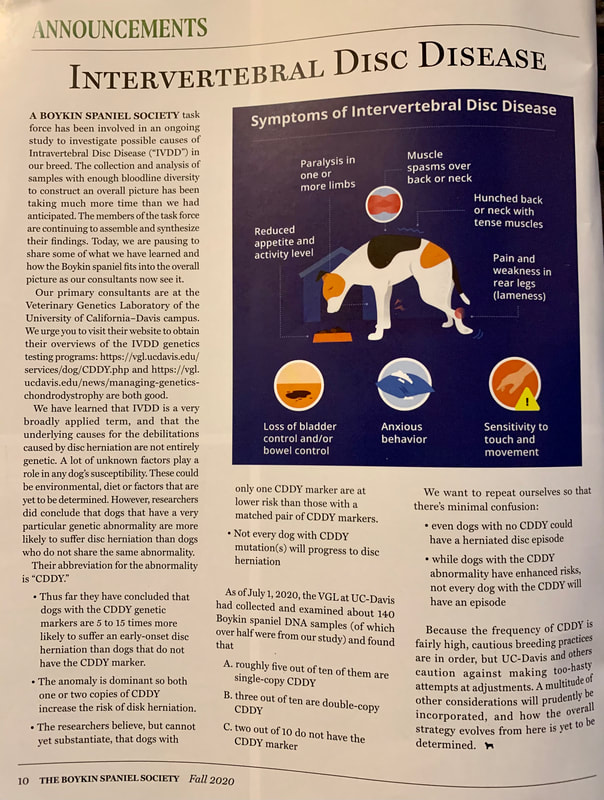A Boykin Spaniel Society task force has been involved in an ongoing study to investigate possible causes of Intravertebral Disc Disease ("IVDD") in our breed. The collection and analysis of samples with enough bloodline diversity to construct an overall picture has been taking much more time than we had anticipated. The members of the task force are continuing to assemble and synthesize their findings. Today, we are pausing to share some of what we have learned and how the Boykin spaniel fits into the overall picture as our consultants now see it.
Our primary consultants are at the Veterinary Genetics Laboratory of the University of California–Davis campus. We urge you to visit their website to obtain their overviews of the IVDD genetics testing programs:
https://vgl.ucdavis.edu/services/dog/CDDY.php and https://vgl.ucdavis.edu/.../managing-genetics... are both good.
We have learned that IVDD is a very broadly applied term, and that the underlying causes for the debilitations caused by disc herniation are not entirely genetic. A lot of unknown factors play a role in any dog's susceptibility. These could be environmental, diet or factors that are yet to be determined. However, researchers did conclude that dogs that have a very particular genetic abnormality are more likely to suffer disc herniation than dogs who do not share the same abnormality.
Their abbreviation for the abnormality is "CDDY".
· Thus far they have concluded that dogs with the CDDY genetic markers are 5 to 15 times more likely to suffer an early-onset disc herniation than dogs that do not have the CDDY marker.
· The anomaly is dominant so both one or two copies of CDDY increase the risk of disk herniation.
· The researchers believe, but cannot yet substantiate, that dogs with only one CDDY marker are at lower risk than those with a matched pair of CDDY markers.
· Not every dog with CDDY mutation(s) will progress to disc herniation
As of July 1, 2020, the VGL at UC-Davis had collected and examined about 140 Boykin spaniel DNA samples (of which over half were from our study) and found that
a. roughly five out of ten of them are single-copy CDDY
b. three out of ten are double-copy CDDY
c. two out of ten do not have the CDDY marker.
We want to repeat ourselves so that there's minimal confusion:
· even dogs with no CDDY could have a herniated disc episode
· while dogs with the CDDY abnormality have enhanced risks, not every dog with the CDDY will have an episode
Because the frequency of CDDY is fairly high, cautious breeding practices are in order, but UC-Davis and others caution against making too-hasty attempts at adjustments. A multitude of other considerations will prudently be incorporated, and how the overall strategy evolves from here is yet to be determined.
Our primary consultants are at the Veterinary Genetics Laboratory of the University of California–Davis campus. We urge you to visit their website to obtain their overviews of the IVDD genetics testing programs:
https://vgl.ucdavis.edu/services/dog/CDDY.php and https://vgl.ucdavis.edu/.../managing-genetics... are both good.
We have learned that IVDD is a very broadly applied term, and that the underlying causes for the debilitations caused by disc herniation are not entirely genetic. A lot of unknown factors play a role in any dog's susceptibility. These could be environmental, diet or factors that are yet to be determined. However, researchers did conclude that dogs that have a very particular genetic abnormality are more likely to suffer disc herniation than dogs who do not share the same abnormality.
Their abbreviation for the abnormality is "CDDY".
· Thus far they have concluded that dogs with the CDDY genetic markers are 5 to 15 times more likely to suffer an early-onset disc herniation than dogs that do not have the CDDY marker.
· The anomaly is dominant so both one or two copies of CDDY increase the risk of disk herniation.
· The researchers believe, but cannot yet substantiate, that dogs with only one CDDY marker are at lower risk than those with a matched pair of CDDY markers.
· Not every dog with CDDY mutation(s) will progress to disc herniation
As of July 1, 2020, the VGL at UC-Davis had collected and examined about 140 Boykin spaniel DNA samples (of which over half were from our study) and found that
a. roughly five out of ten of them are single-copy CDDY
b. three out of ten are double-copy CDDY
c. two out of ten do not have the CDDY marker.
We want to repeat ourselves so that there's minimal confusion:
· even dogs with no CDDY could have a herniated disc episode
· while dogs with the CDDY abnormality have enhanced risks, not every dog with the CDDY will have an episode
Because the frequency of CDDY is fairly high, cautious breeding practices are in order, but UC-Davis and others caution against making too-hasty attempts at adjustments. A multitude of other considerations will prudently be incorporated, and how the overall strategy evolves from here is yet to be determined.

